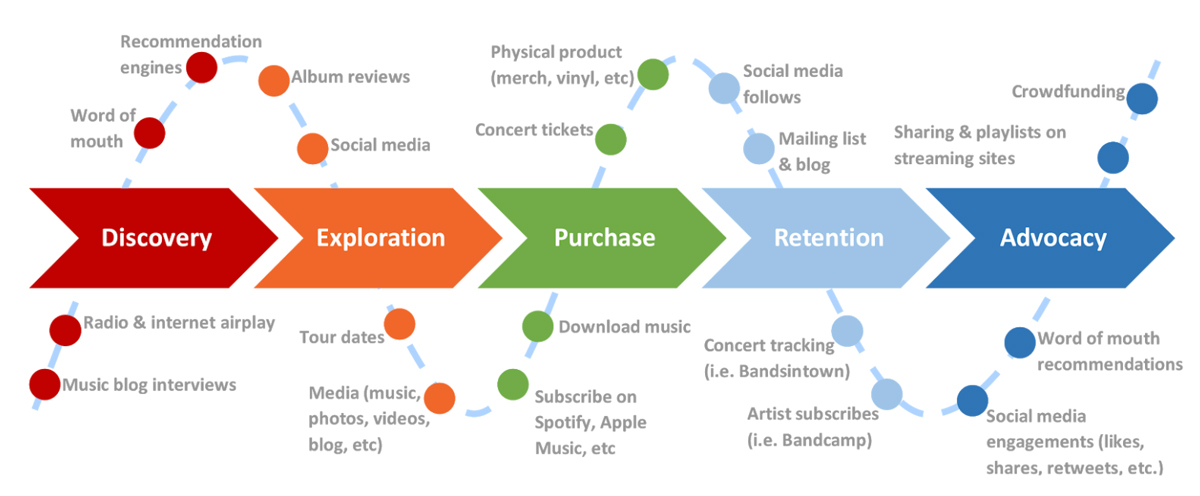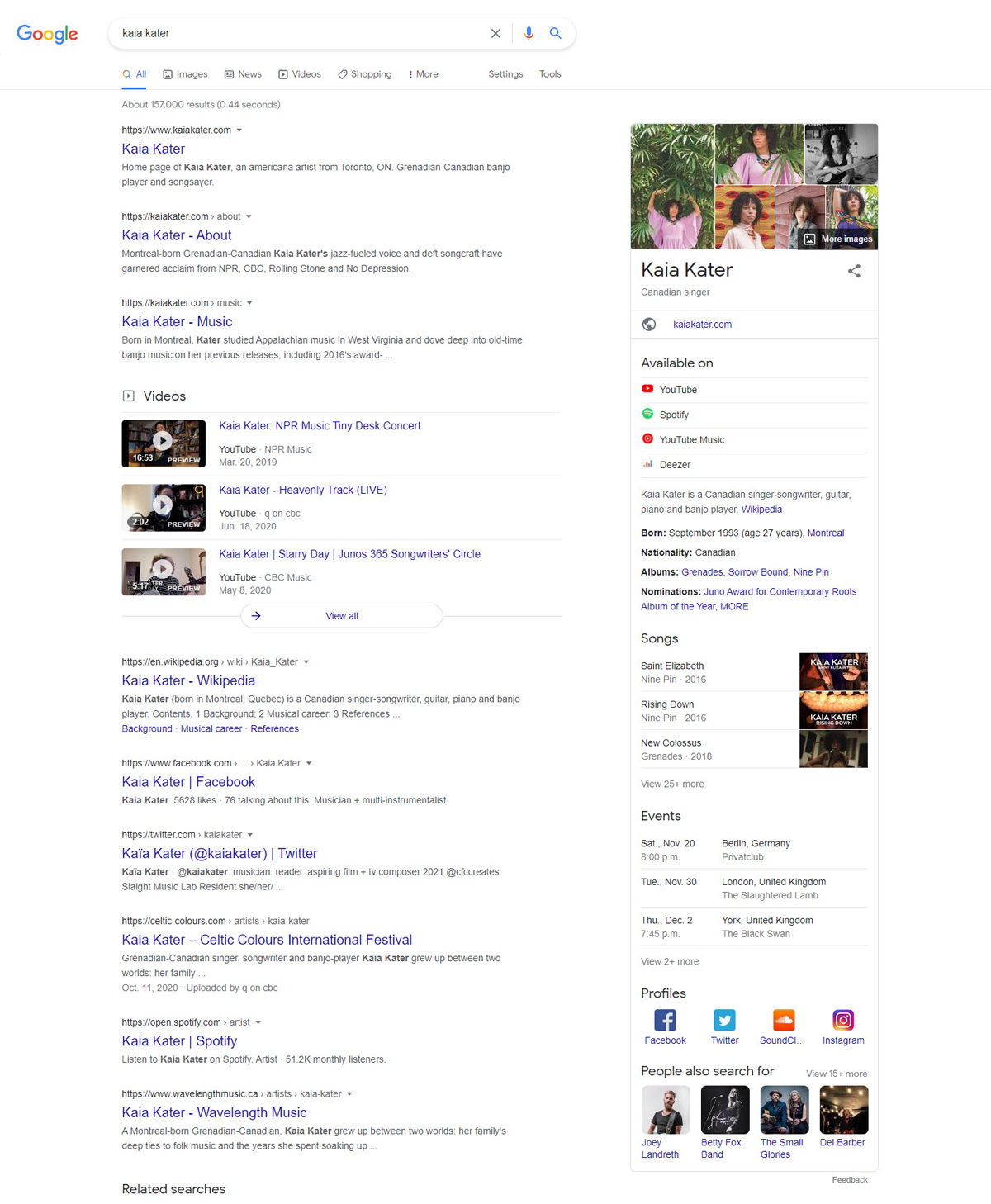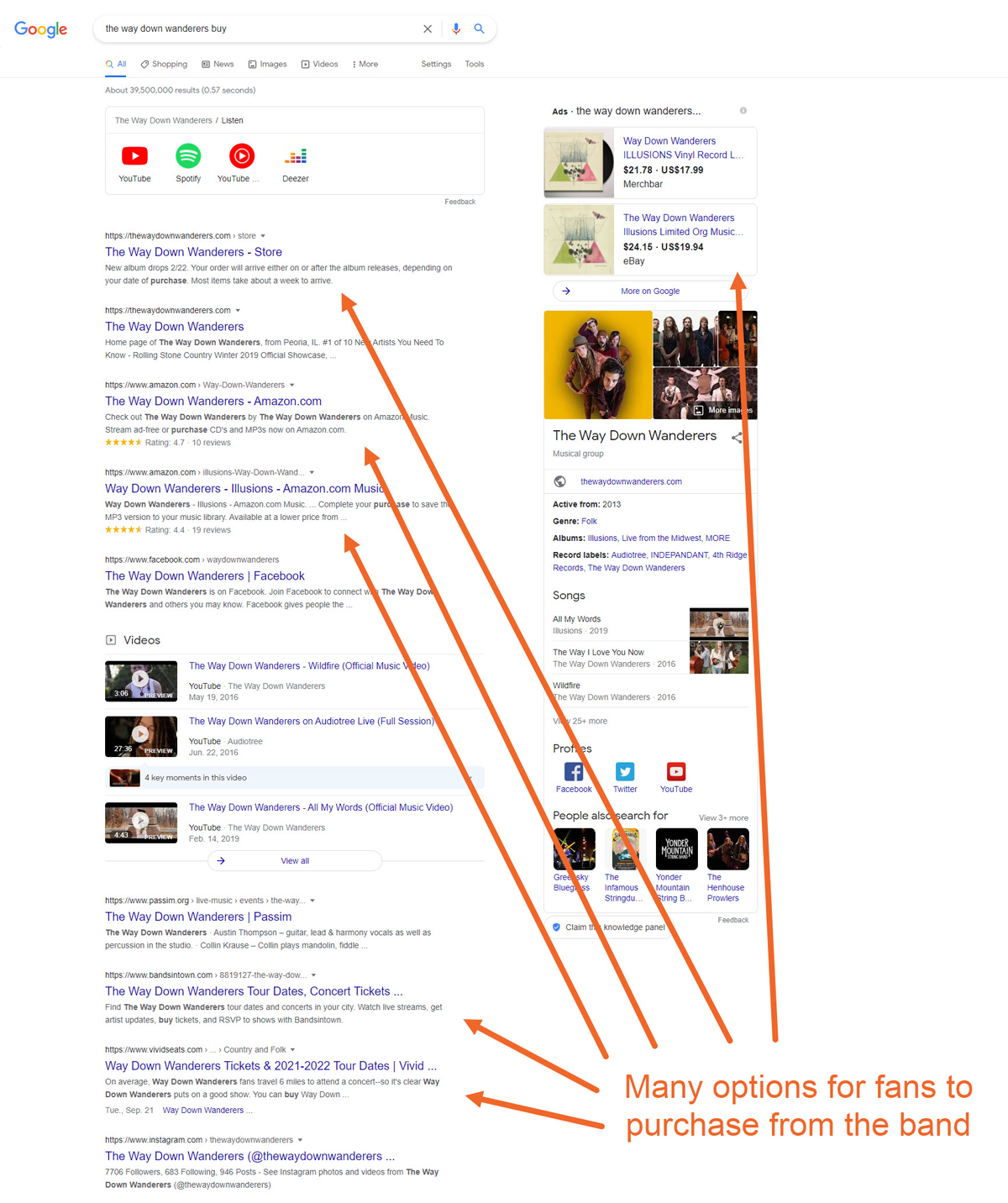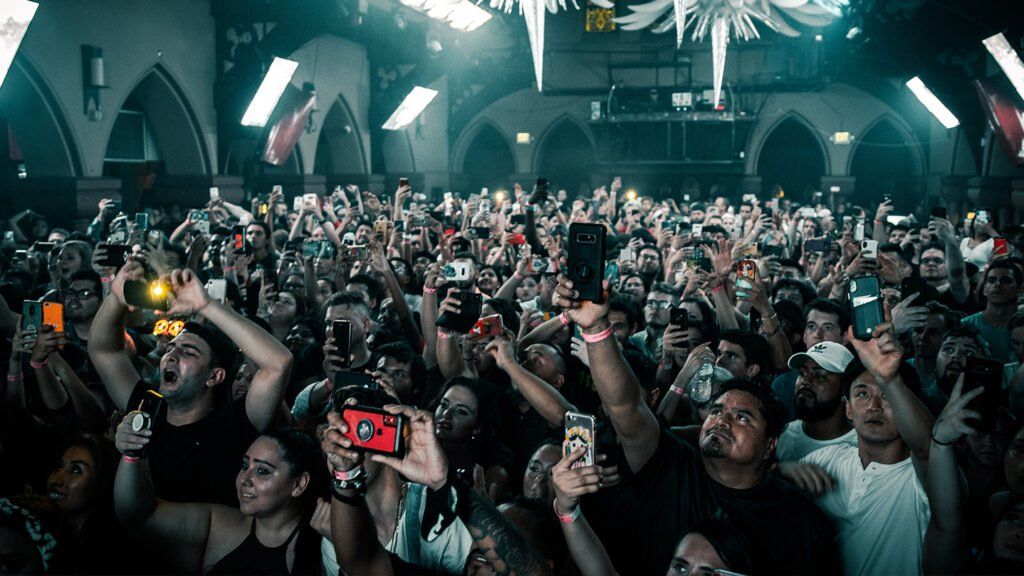Search engine optimization is a topic that comes up often when we talk to musicians about music marketing. SEO is well-known as an important marketing channel, plus it’s free, and it works. But it can also be complex, time consuming, slow to see results, and it’s not always particularly easy to do well.
Over the six posts in this “SEO for Musicians” blog series, we’ll help you focus your efforts on making the most of search engine optimization for marketing your music.
We’ll cover not only the basics – like optimizing title tags, getting backlinks and such – but also the aspects of SEO that make it a little different for musicians than for everyone else. To begin, we’ll dig into the bigger picture:
“How can SEO help me as a musician?”
If you want a shortcut, you can read our Complete SEO checklist for musicians. But we think you should take a few minutes to read this post and consider what your strategy is before you start investing your time into SEO.
The Fan Journey
For most artists the key purpose of SEO is to make your content discoverable in search engines, and to create a positive and engaging experience for fans.
It might seem obvious, but search engines are only useful as a marketing tool when people are searching for something. Ultimately SEO is about making sure that when people are looking for specific information, they’re able to find relevant content that solves their need as quickly as possible.
So in the context of you as a musician, where might that come into play? What kind of information about you might people be looking for, and how can you give them the best experience possible as they are trying to find it?
Your online presence is probably spread across many different platforms – your music website, social media, video, streaming, tour dates, and eCommerce. With each of those properties serving a different purpose for fans at different points, search engines help fans get to those places with less effort.
Throughout all of those different interactions across all of those different platforms, sometimes search engines are going to be really important. But at other points they’re not very important at all. Ideally you would focus your SEO efforts on the points where search engines are most important.
Build a music website that’s SEO-friendly. Bandzoogle offers built-in tools to optimize your website for search engines. Sign up with Bandzoogle now.
To help understand and visualize where search engines matter, we reimagined the classic “customer journey” marketing framework. We call it the Fan Journey and it looks something like this.
 Let’s use this framework to take a look at each of the steps.
Let’s use this framework to take a look at each of the steps.
The Discovery phase is just what it sounds like – the point where people first start to hear about you and your music.
For most businesses it’s this early stage on the customer journey where search engines play probably the biggest role, and where SEO work is most effective. Customers often discover new products and services for the first time by Googling the thing they need – which can be very lucrative for businesses who offer those things.
But it’s not the same for musicians. That’s because – it’s fair to say – pretty much nobody discovers new music by searching on Google.
Which means that putting all your effort into an area of SEO that matters to most other businesses would be, for you, a bit like playing to an empty room.
This is what an empty room looks like in SEO.
Source: Google Keyword Planner Tool
You could rank at the top of the search results for that term and nobody’s going to notice because, according to Google’s Keyword Planner Tool, no one searches for it.
Let me point out one big glaring caveat though. If you are specifically marketing a more traditional business service that people are indeed looking for, such as local music lessons or wedding entertainment, then this is an area where search engines could help customers find you.
But if it’s music you’re marketing, and fans you’re looking for, then let’s move on. While Discovery – getting your music in front of people who want to listen – is undoubtedly a hugely important stage of the Fan Journey for marketing, it’s not where search engines are really going to help you much.
Engagement is what happens once a fan discovers you, likes what they hear, and wants to hear more.
This is where search engines start to really matter for most bands. Think about this: when a person hears your music for the first time and likes it – but they don’t know your band yet – what are they most likely going to do next?
There’s a good chance they’ll want to learn more about you – what you look like, where you come from, what your other music sounds like, where you’re playing next, etc.
One of the first things they might do is Google your band name… Or if they don’t know your band name, maybe they’ll search for the name of the song they heard….Or maybe they don’t know the name of the song so instead they search the lyrics from the hook that got stuck in their head….
Let’s take a look at a real example of that. Let’s say someone has just watched Kaia Kater play on Tiny Desk, and they’re interested to learn more about the artist. That person goes to Google, does a search, and…

So much great stuff there! Now this person has a nice variety of engaging content at their fingertips to check out.
So for you as the band, this is where SEO really comes into play in a big way. It’s your opportunity to show your new fan everything you’ve got, and get them engaged. If you can do that, then they’re probably much more likely to really “become a fan” and carry on through the Fan Journey. That’s the ideal scenario for you at this point.
So you can help engage fans at this point by making sure they can easily find things like:
Your website, so they can learn about you
Your social profiles, so they can connect and see what kind of things you say
Music to stream, so they can sample your sound and decide whether they like it
Videos and images, so they can get a feel for what you look like
Interviews and reviews, so they can get a sense for who you are and what others say about you.
If you have content like this, then clearly you’ve put enormous efforts into creating it. And search engines can help you get that content in front of more (potential) fans when they’re looking for it. It’s that simple, from a strategy perspective.
So the Engagement phase of the Fan Journey is where search engines can really help you, and it’s where you’ll probably want to spend most of your SEO efforts.
The Purchase phase of the Fan Journey is, of course, top-of-mind for most artists. Like any business or entrepreneur, you need to make money to keep going.
Search engines can help you here.
A simple rule-of-thumb is the more quick and easy you can make it for fans to spend their money on you when they want to, the more likely you are to earn more sales. That can apply to any way you earn revenue like selling music downloads, merch or tickets, or even crowdfunding or streaming – whatever your objective is.
Search engines can be really useful for this. Let’s look at the band The Way Down Wanderers for a real-life example.
Let’s say, for the sake of simplicity, a fan searches for “the way down wanderers buy”. It’s fair to say that, based on what they’re searching, that fan likely intends to make a purchase from the band.
If the band wants to earn that purchase, first of course they need to be offering things for sale somewhere. And then they would want to make that fans’ experience as frictionless as possible. Make it smooth and simple for them, with the least amount of clicks, all the way from that Google search through to the transaction.
Using search engine optimization, the band could help make sure the most relevant content for those searches appears front-and-center, so that fans can find the right place to go right away, without much effort.
So let’s see what The Way Down Wanderers did.

Nice.
The band has done the legwork and provided their fans with a wealth of different ways to spend their money on them, in whatever way is most convenient or interesting to the fan. It’s all very easy to find by doing just one Google search.
So we want to make sure your fans can easily find:
Tour dates and concert tickets
Somewhere to buy your music for download
A store to buy physical music formats and merch
Your profile on major streaming services to easily sync your music
Any other place where you make money from your music online
For the Purchase phase of the Fan Journey, you can use search engines to provide a better buying experience for your fans, and by doing so, earn yourself more sales.
With such a huge amount of new music being released consistently, and in an era where fans are fickle and we all have short attention spans, there’s no guarantee that you’ll keep the attention of your hard-won fans even after you’ve initially earned it. That’s what makes Retention so important to your marketing.
Search engines, though, may not have a big role to play here for you. At this point your fan has gone to your concert, maybe downloaded your album or bought some merch. To retain your fans after this, ideally they will follow you on your socials and subscribe to your mailing list. Most of your Retention marketing will likely happen through channels where you’re able to reach them in a more direct way.
So for example you might promote, on your band website, all of the places where fans can follow you.
 As far as SEO is concerned, as long as your fans can still find you when they do look for you, that’s all the search engines need to do for Retention. If you’ve already done your SEO work for the earlier stages of the Fan Journey then you likely don’t need to do any additional optimization here.
As far as SEO is concerned, as long as your fans can still find you when they do look for you, that’s all the search engines need to do for Retention. If you’ve already done your SEO work for the earlier stages of the Fan Journey then you likely don’t need to do any additional optimization here.
The Advocacy stage of the Fan Journey is where you’ve already won your fan over to the point where you could perhaps consider them a super fan. They follow you, and you’ve created some sort of relationship with them. They feel invested in your success. They want to share your music with other people, to help build the movement. They’re the ideal, devoted fan.
Of course Advocacy is a very important Fan Journey stage for your band. But again search engines probably won’t be especially useful to you here, because at this point your super fans don’t need Google to find you – they already know where you are.
The Takeaway: Get To Know Your Fan Journey
At this point you might be thinking “OK I get that, but how do I actually start doing SEO?”
In the following posts we’ll dig deeper into the technical and tactical advice you can use to create a positive search engine experience for your fans.
In the meantime, get to know your own Fan Journey. You might consider actually mapping out what it looks like for you.
Take some time to think about how search engines could help you with the Engagement and Purchase steps of the Fan Journey especially. But look at the other steps too. Maybe there is something specific to your band where search engines might help with efforts you’re making in Discovery, Retention or Advocacy.
Hopefully you now have an understanding of where you need to start with your SEO. Next time we’ll explore tactics that you can take action on.
This content was originally published here.




